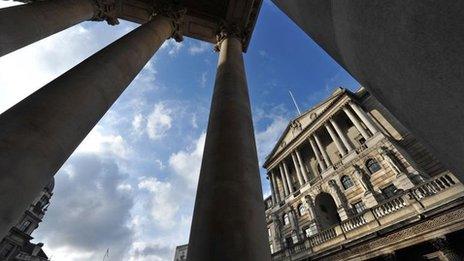Bank of England keeps UK interest rates at record low
- Published

The Bank of England has left interest rates unchanged at 0.5% and made no change to its programme of quantitative easing, as had been widely expected.
The decision came as no surprise as the Bank has said it will not consider a rate rise until the unemployment rate falls below 7%.
The focus will now switch to the Bank's latest inflation report, due next week.
Analysts will examine the report for indications on how strongly the Bank thinks the UK economy is recovering.
Timing
The Bank of England's Monetary Policy Committee (MPC) has kept interest rates on hold at 0.5% since March 2009.
Analyst David Buik says UK interest rates "cannot remain at that level for an indefinite period of time"
Under the Bank's policy of forward guidance, brought in under new governor Mark Carney, it has said it will not increase interest rates until the rate of unemployment has dropped below 7%.
When the Bank first announced this, in August this year, it said it did not expect this to happen until 2016.
However, many analysts believe that the Bank will have to act sooner than that - possibly in 2015 - given the increasing strength of the UK's economy.
The last set of unemployment figures showed the jobless rate had dropped to 7.7% in the June-to-August period.
The economy grew by 0.8% in the third quarter of the year, and recent economic surveys have indicated that growth remained strong in October.
"The decision to hold interest rates and QE was expected and correct," said David Kern, chief economist at the British Chambers of Commerce.
"However, as the pace of economic growth strengthens, it is becoming clear that the first rise in official interest rates is likely to occur well before the Committee's 2016 prediction, due to the earlier than anticipated fall in unemployment.
"The MPC must use next week's Inflation Report to move towards a more realistic timetable for its forward guidance, to maintain business confidence and keep its credibility."